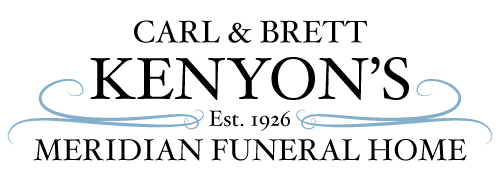As part of my series of interviews with local business owners I recently had the pleasure of spending some time with Carl Kenyon. As the owner of The Meridian Funeral Home, Carl is a well-known personality in Chorley. This is a rare insight into the history and workings of a local funeral business. I started by asking Carl about his family business.
“My Grandfather had been a master joiner in Chorley and had started his own business in 1925, he then went into being an undertaker the original name for funeral directing. He used to make his own coffins, this is how most funeral directing businesses were started back then, if you were a joiner then funeral directing was a side line to making extra money, he would only do 1 or 2 funerals per month. I remember going into the cellar at my grandparents’ house and seeing some of the old tools he used to make the coffins with. To make the coffins water tight he used to melt pitch and pour it into the joins of the wood, but this was before my time.”
“So how did you come to get involved in the family business Carl?”
“I used to help my father when I was at school from the age of 15 years. This would be during the night if anyone passed away at home or in a nursing home. We would bring the deceased back to our “rooms of repose”.
“Previously, after leaving school in 1976, I’d had another related job. I used to dig the graves in the churchyards, for this I got £7.00 per grave. Today a grave digger gets £250.00 per grave and can usually use a machine to dig it with. I do remember one grave in particular one very cold winter. The ground was frozen solid to a depth of 2 feet. It took me most of a day to dig through the frozen ground. When I got home and I was nearly crying I was so cold and the next day I had to get up early and finish the job, and I still only got £7.00. I did this for about 2 years by the time I finished the fee for digging has risen to £11.00.”
“What other have things changed since you first joined the funeral industry?”
“Well one example is that after we had prepared the deceased, (dressed and placed in a coffin), more often than not we would then take them back home where they would lie at home until the time of the funeral. Then of course most funerals, probably around 70% were either burials or interments (within tombs)”. It was very straight forward and people’s needs were much simpler.
So how are things different today?
“Well today about 80% of funerals are cremations. Also people have a lot more services to choose from and want to be involved in how they say their final farewell.”
So what are some of the changes we can expect to see more of in the future?
“Well for some time now there has been a much wider selection of coffins. Where previously it was all about solid wood, now there are also veneered coffins, wicker, bamboo, coffins can be of any colour and pattern, even down to your favourite football club.”
If there is more choice available, I guess that means that your role has changed in what you need to discuss and arrange with a bereaved family?
“Yes there is a lot more to it. Flowers, buffets, donations, printing and newspaper obituaries are all left to the funeral director to sort. Even the administration has changed. The forms need are now much more complicated than in the past. This is partly due to because in the case of a cremation two doctors must now see and examine a deceased to make sure the doctor issuing the death Certificate has done no wrong.”
“Things like that add extra time to the process and probably add more pressure for you?”
“It is a very pressured job. We do not get a second chance, everything has to be right the first time and all the timings have to right. Because the population is so much bigger then it follows that a lot more people are passing away. This is why we have to be at the crematoriums on time because there is always another funeral to follow and being late would have a knock on effect.”
“I suppose then I don’t need to ask you what keeps you up at night?”
“I can’t tell you how many times I have woken up in the night and gone into work to re check that everything is in order for the days funeral.”
“Yes, it’s that attention to detail which takes such time, effort and commitment?”
“Yes overall the job needs a lot more man hours and a lot more thought and paperwork, but I have developed with the changes and I can say I love my job I could not do anything else”.
“After all this time you must feel very close to the local community?”
“I know a lot of people in my town (Chorley) and I like to make sure that in their hour of need I am there for them, I have arranged and conducted an average of 250 funerals a year for the last 30 years.
“You took over the business from your father Bernard. One day do you hope to hand over the business within your family?”
“Absolutely I hope to be around for many more years to come, but my son Brett has now been in the business for about 6 years. He like me all those years ago is learning all aspects of the job and I enjoy helping him and passing on my knowledge to him.”
Thank you Carl
Carl Kenyon Funeral Director and Owner of Meridian Funeral Home Chorley
Interview by Adrian Hargreaves
